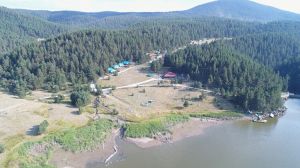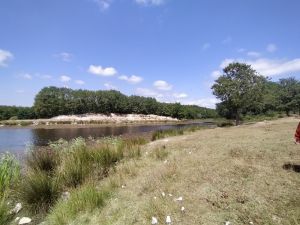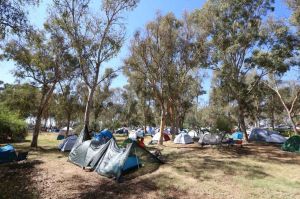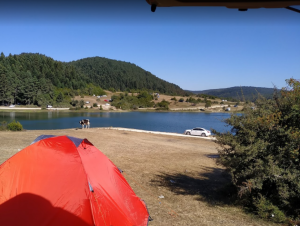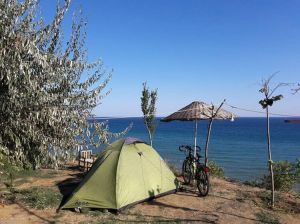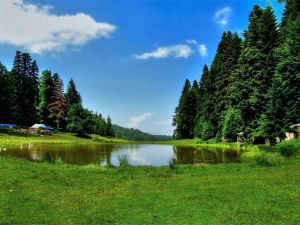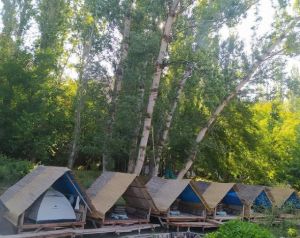tented camp
The tent camp, It's a great option for those who want to experience the outdoors in nature. Tent camping is the activity of making temporary accommodation in the open air, in a natural environment, using tents or similar portable shelters. These types of camps are usually held in natural areas such as forests, mountains, lakes, or beaches, and aim to provide a relaxing experience by taking people away from the stress of city life. When camping in tents, campers build their own shelters, light fires, and cook in the open air.
Elements to Consider in a Tent Camp
Elements to watch out for in tent camping The first step is to choose a suitable campsite. Natural areas such as national parks, forests, lake shores are usually preferred. However, it is important to get permission or check local rules before going to the area where you want to camp. In addition to the tent, you will need basic camping equipment such as sleeping bags, mats, cooking equipment, and a camp lamp. When camping, you shouldn't forget about safety. You may encounter wildlife, so you must keep the food safe and dispose of the garbage properly. When lighting a campfire, it's important to follow local rules and control the fire safely. When camping, you should pay attention to basic safety principles. You have to communicate with the other camps, have emergency communication devices and monitor the weather.
This is %city Characteristics of a suitable tent for tent camping
Features of a suitable tent for tent camping, you should choose a tent that suits your needs when camping.
- Purpose of use: First, you need to determine the purpose of the tent. Are you going to use it for overnight accommodation or for longer-term camping trips? There are different types of tents for different purposes, such as mountaineering, cycling tours, family camping or single camping.
- Seasons and Weather : Whatever seasons and weather conditions you plan to camp in, it is important that your tent is suitable for this. Three-season tents are usually suitable for mild weather conditions, while four-season tents are resistant to harsher winter conditions.
- Capacity: How many people will sleep in the tent? The capacity of the tent should be commensurate with the number of people who can fit comfortably inside. You should also consider extra space to store your supplies and equipment.
- Weight and portability : Ease of transportation is important, especially in activities such as walking. Choosing a lightweight and portable tent will make it easier to carry in your backpack or bicycle when camping.
- Ease of installation and assembly: The installation and assembly of the tent should be simple and quick for you. You must remember that a tent that is difficult to set up will negatively affect your camping experience.
- Material and endurance : The quality and durability of the materials used in the construction of the tent is important. Waterproofing is critical to keeping you dry inside the tent.
- Height and height of the room: Choosing a tent in which you can stand comfortably can offer a more comfortable camping experience. Also, tents with high ceilings can create a more spacious feel.
- Additional features: Some tents have extra features, for example, internal compartments, ventilation windows, insect or sunscreen ceilings. These features can make your camping experience more comfortable.
Materials needed for tent camping
The supplies for the tent camp, Camping locations may vary depending on weather conditions and personal preferences. But in general, the basic supplies you'll need for tent camping will be:
- The tent: The tent is the most important part of the camp. You have to choose a tent that fits the camping area. There are varieties for two or more people.
- Sleeping bag or blanket: A sleeping bag keeps you warm and allows you to sleep comfortably. You should choose a sleeping bag according to the weather conditions. Also, a light blanket might be helpful.
- Floor mat or mattress: A floor mat or inflatable bed provides comfort when lying on the floor and protects your body from cold and moisture.
- Camp Chair or Mat: A camping chair or mat is useful for sitting on a camping site. Provides a comfortable seating surface.
- Kitchen equipment: The equipment needed to prepare camp meals includes items such as picnic plates, fork-knife-sets, pot-pot sets, water boiler or camp stove.
- Food and Drink: When camping, don't forget to bring food and drink. Dry foods, canned foods, water, snacks, and drinks such as coffee or tea are things you may need when camping.
- Camp lamp or lantern: You should have a camp lamp or lantern to provide lighting at night.
- Knife and Stick: A versatile knife or multi-purpose knife should be among your camping supplies.
- First aid kit: You should have a first aid kit to treat minor injuries.
- Personal hygiene products: You should not forget personal hygiene products such as toothbrush, toothpaste, soap, shampoo, towels.
- Clothes for the camp: You should choose clothes that are suitable for the weather. Waterproof raincoats, clothing suitable for hot and cold weather should be on the camping clothing list.
- Map and Compass: If you're camping in an unfamiliar area, it's important to have a map and a compass.
- The garbage bags: You must carry garbage bags that you can use to keep the campsite clean.
These supplies are what we need for the basic tent camp. However, depending on the characteristics of the campsite and personal needs, extra equipment may be required. Before camping, it is important to prepare a list of supplies, taking into account the weather conditions and the rules of the campsite.
